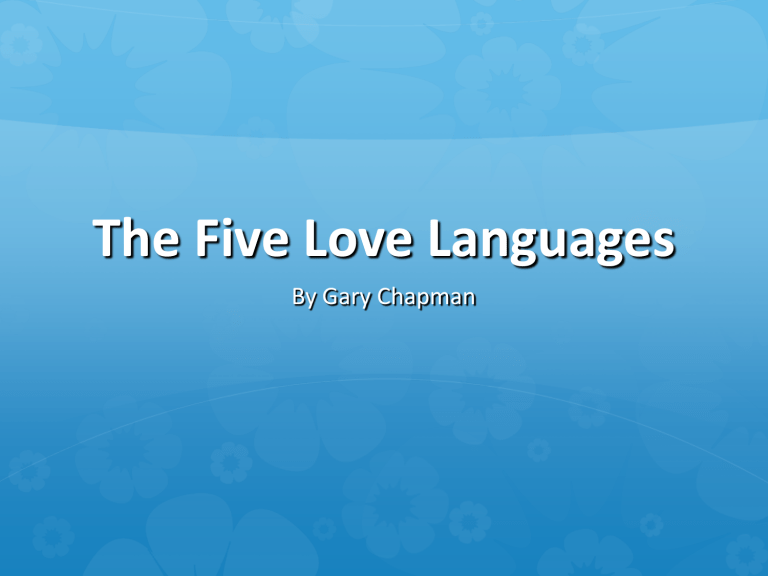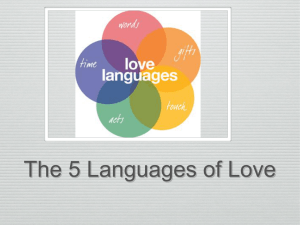
The Five Love Languages By Gary Chapman There are many different languages in the world. Ek is lief vir jou (Afrikaans) Ngo oi ney (Catonese) Ik hou van jou (Dutch) Tora dust midaram (Farsi) Je t'aime(French) Ta gra agam ort (Gaelic) Ich liebe dich (German) Ayor anosh'ni (Navajo) If you do not understand the language….. Then what you mean to say is lost. It is the same for communicating love to another person. Gary Chapman came to the conclusion that people speak five different emotional love languages, plus various dialects. In order to communicate love, one must learn which language of love to speak. Everyone needs to know they are loved. It starts as a child…. …and continues through adulthood. Being “in love” fills this need At least for a while! During the “in love” phase, you minimize the flaws of the beloved. You think about them all the time. You want to be with them all the time. Then reality enters in. Should the toilet lid be up or down? Who does what chores? Where do you spend the holidays? Decisions on how to spend the money? What do you do when the “love” leaves? Never be with anyone again? (That’s lonely.) Have an affair? (even that “excitement” only lasts so long) Divorce/break up? (And start again and again every few years) Or is there a different and better way? The better way is to learn what your love language is, learn what your beloved’s is, and then learn to speak that language. How many times have you seen a couple fall apart? “He doesn’t care about me.” “She doesn’t care about me.” Both are reaching out to each other in a language the other does not understand. He brings her roses. He’d like more affection. She cooks his favorite meal. She’d like help with the kids. Like most people, Each person is trying to make it work. Sort of…… But, each person speaks a different language of love. Like a foreign language, they are not understood. There are five languages of love. Words of Affirmation Quality Time Receiving Gifts Acts of Service Physical Touch Let’s look at each one. First language: Words of affirmation These are compliments or words of appreciation. It is not saying something nice so you can get what you want from them. Also included are words of encouragement. The tone of your voice matters. Keep it kind! If asking for something, make it a request, not a demand. Language #2: Quality time Quality time is spending time with each other, without being distracted by other things around you. You are both doing an activity you enjoy (or one enjoys and the other is willing to do), to be together, and the focus is not on the activity as much as it is on being together. This means getting to know your spouse by talking with each other. “What do you think about…..” No interrupting, no giving advice (unless asked for!) Listen to what they are saying and respond kindly to it! Be willing to share your feelings, wishes, and dreams. Language #3: Receiving Gifts A gift is a visual symbol of the love you have for the other. The cost of the gift does not matter, as much as the thought and effort put into giving the gift. Gifts may be homemade, bought, or found. A single flower given a dozen times will have more meaning than a dozen roses given one time. Love is a difficult emotion to express, and a gift is a visual symbol of that love. Language #4: Acts of Service Acts of service is love expressed by actions. You put thought, time, energy, and effort into deciding what would please your spouse the most. Love this way may be shown as helping with various chores, such as cleaning. It may be taking the children out for the afternoon so your spouse can have some quiet time alone. It takes time and effort to decide what specific actions would mean the most to your spouse. What is important to one is not important to another. Language #5: Physical Touch No, it’s not just about sex. It may include hugs, holding hands, a brief touch to one’s shoulder, or a brief kiss before leaving home. We all have a need to have physical touch in our lives, from the time we are infants. People who express love in this way have a greater need than others. No matter what the form of love you show, It’s not really love if you are expecting something in return. Love is freely given, in a way that the other person can understand, with no demands on the other person to give back in the same way. Real love is not as much an emotion as it is a choice and a series to actions to express that choice. You cannot change the past, but you can apologize and make the future different. Figure out your own love language. Take the simple assessment. Then figure out the language of the person you love. What things do they appreciate? What do they ask for? What annoys them? These give you clues. Try many ways until you find out what means the most. Sometimes there is a primary and a secondary love language. It is very rare that you both speak the same love language. This works in any relationship between two people. Learn your own love language. Figure out what the love language is of the other person. Work at keeping their “love tank” full by showing love in ways that the other person can understand. Maybe you don’t want to show love in those ways. You’ll have to decide how important that relationship is to you. Don’t let your pride get in the way. The choice is up to you.

